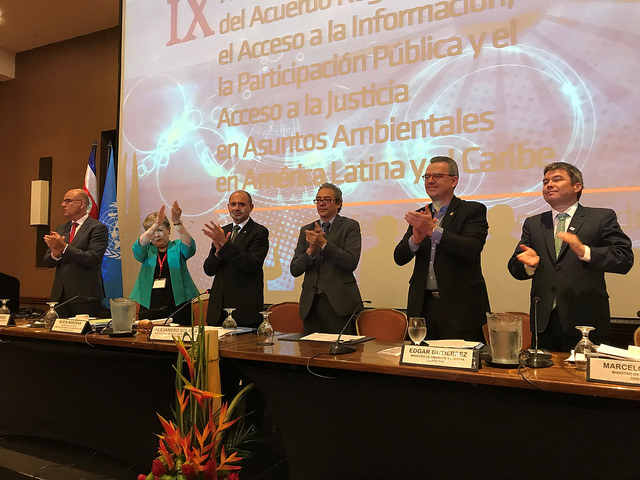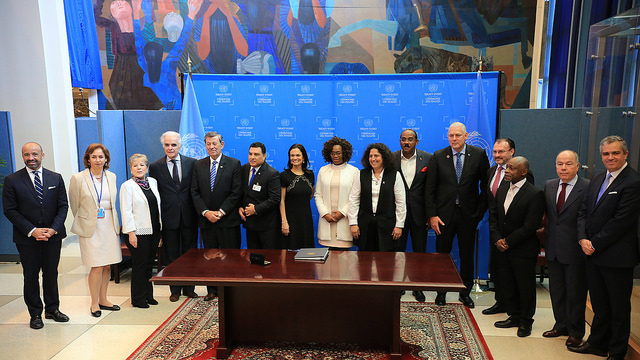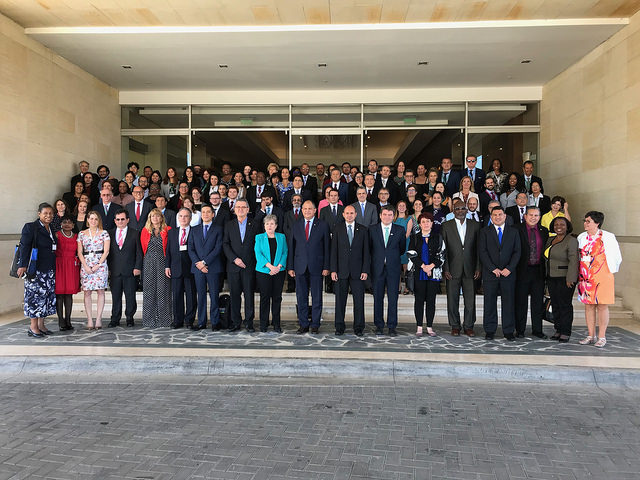Empowering people and ensuring inclusiveness and equality for sustainable development: the Regional Agreement on Access to Information, Public Participation and Justice in Environmental Matters in Latin America and the Caribbean (Escazu Agreement)
Description
The Escazu Agreement, adopted in March 2018, is the first environmental treaty of Latin America and the Caribbean and the only one stemming from Rio+20. The Agreement is the remarkable result of a process the began in 2012 at Rio+20 and comes after nine meetings of the negotiating committee convened since 2014 with significant participation of the public. The process recognized that the world is facing several fundamental challenges, such as climate change and the depletion of natural resources, which require profound transitions towards sustainable development and that these challenges cannot be met by any one actor alone.
The Objective of the Escazu Agreement is to guarantee the full and effective implementation in Latin America and the Caribbean of the rights of access to environmental information, public participation in the environmental decision-making process and access to justice in environmental matters, and the creation of and strengthening of capacities and cooperation, contributing to the protection of the right of every person of present and future generations to live in a healthy environment and to sustainable development. Thus, through transparency, openness and participation, the regional agreement contributes to the shift towards a new development model and tackles the region’s inefficient and unsustainable culture of narrow, fragmented interests. In that vein, the agreement vows to include those that have traditionally been underrepresented, excluded or marginalized and give voice to the voiceless, reaching those furthest behind. The Agreement puts an emphasis on persons and groups in vulnerable situations with specific obligations to overcome barriers in the exercise of their rights. It also includes specific provisions to ensure a safe and enabling environment for environmental human rights defenders. For example, it provides for obligations to minimize/waive costs, identify and actively include certain groups in policy/decision-making, provide guidance/assistance, guarantee accessibility or consider specific characteristics of the public. With this agreement, the region is also giving a true example of how to balance the three dimensions of sustainable development. By engaging the public in all decisions that affect them and establishing a new relationship between the State, the market and society, our countries are refuting the false dichotomy between environmental protection and economic development. Growth cannot take place at the expense of the environment and the environment cannot be managed disregarding our economies and peoples. The Escazú Agreement puts Principle 10 of the Rio Declaration into practice and offers an unparalleled platform to strengthen the implementation of Multilateral Environmental Agreements in the region (for example, article 6 of UNFCCC and 12 of the Paris Agreement). It is also crucial to pool efforts for engaging the public effectively in decision making on environmental matters and respond to the many challenges faced by our region, from the degradation of the environment and ecosystems and the plundering of natural resources associated with today’s production and consumption dynamics, compounded by urban concentration, to social inclusion and equality and eradicating poverty. These challenges are being exacerbated by global challenges such as climate change that greatly impact the LAC region, particularly its vulnerable persons and groups. The Escazú Agreement is embodied in all Sustainable Development Goals (SDGs), contributing to the fulfilment of the United Nations 2030 Sustainable Development Agenda. In particular, SDG 16 promotes peaceful and inclusive societies, requires guaranteeing equal access to justice, effective, reliable and transparent institutions and the adoption of inclusive, participatory and representative decisions. It also calls to ensure public access to information and promote non-discriminatory laws and policies for sustainable development. Environmental democracy links human rights, the right to a healthy environment and public policy, making it fundamental to achieve the SDGs.
Initiated at Rio+20 and grounded on the tenets of Principle 10 of the 1992 Rio Declaration on Environment and Development, the regional agreement came into existence after a preparatory phase of two years and nine intense meetings of its negotiating committee, with significant participation of the public. The Agreement opened for signature of the 33 countries of Latin America and the Caribbean on September 27, 2018 at United Nations Headquarters in New York, coinciding with the high-level segment of the General Assembly. From that moment it can also be ratified. 16 countries have signed already the Agreement: Antigua and Barbuda, Argentina, Brazil, Bolivia, Costa Rica, Dominican Republic, Ecuador, Guatemala, Guyana, Haiti, Mexico, Panama, Paraguay, Peru, Saint Lucia and Uruguay. The Escazu Agreement will entry into force once ratified by at least 11 States. Maintaining the momentum and working with countries, civil society and international and regional bodies to support national signature and ratification or accession processes is key to ensure the prompt entry into force of the Agreement. UN ECLAC, as Technical Secretariat, and Costa Rica, as lead country, have been working together to support countries and civil society to undertake actions for the prompt entry into force of the Agreement. Signatory countries are starting to work on the development of a roadmap for implementation of provisions, involving different stakeholders. Those practices will be reviewed at the first Conference of the Parties, expected to be convened by UN ECLAC no later than one year after the entry into force of the Agreement. Furthermore, the agreement has established several monitoring, support and follow-up mechanisms to assist countries in implementing the obligations once it enters into force. The Conference of the Parties shall examine and promote the implementation and effectiveness of the present Agreement. The Secretariat shall provide assistance to the Parties upon their request for capacity-building, including the sharing of experiences and information and the organization of activities, and will operate a virtual and universally accessible clearing house on access rights. A voluntary fund is established to support the financing of the implementation of the agreement and Committee to Support Implementation and Compliance is provided for to promote the implementation and to support the Parties in that regard. Such Committee shall be of a consultative and transparent nature, non-adversarial, non-judicial and non-punitive and shall review compliance of the Agreement and formulate recommendations, in accordance with the rules of procedure established by the Conference of the Parties, ensuring the significant participation of the public and paying particular attention to the national capacities and circumstances of the Parties.
While also promoting inter-regional cooperation, the Escazu Agreement also builds on intraregional and South-South cooperation, allowing for the provision of technical assistance, capacity-building and cooperation among countries of the region. Furthermore, as the Escazu Agreement is a treaty, once ratified by the countries sustainability is ensured by making environmental access rights a State policy that goes beyond political and government cycles. The ratification process, which normally requires internal procedures affecting one or more branches of the State, also fosters internal coordination and consultation within different institutions, bodies and relevant stakeholders.Others regions of the world (Africa, Asia) are looking to replicate this experience.
On 4 March 2018 a groundbreaking pact on environmental matters was adopted in the UN ECLAC region. The Escazu Agreement is the first binding regional agreement of the LAC countries to protect the rights of access to information, public participation and access to justice in environmental matters as enshrined in Principle 10 of the Rio Declaration. It also requires States to guarantee a safe and enabling environment for persons, groups and organizations that promote and defend human rights in environmental matters and to take measures to prevent, investigate and punish attacks, threats or intimidations to these individuals. UN Special Rapporteur on Human Rights and Environment has called it one of the most important human rights treaties and one of the most important environmental treaties of the last twenty years. The Escazu Agreement is the remarkable result of a process the began at the 2012 Rio+20 UN Conference on Sustainable Development and comes after nine meetings of the negotiating committee convened since 2014. Guaranteeing access rights for all is fundamental for addressing inequality and advancing towards environmentally sustainable development. These rights ensure not only that environmental problems disproportionately affecting vulnerable persons and groups are addressed, but also that the needs of those groups are properly considered, in line with the commitment enshrined in the 2030 Agenda to leave no one behind. Access rights in environmental matters therefore constitute a keystone of the relationship between human rights and the environment.The timing for intensifying the full application of Principle 10 could not be more appropriate. The rights of access enshrined in this principle are at the heart of the 2030 Agenda and permeate and are manifested in all the sustainable development goals. The SDGs expressly link human well-being with environmental quality and peace. Five goals address environmental matters (SDGs 6, 12, 13, 14 and 15) and well-being based on the environment is present in the targets of all the other goals. In addition, goal 16, which promotes just, peaceful and inclusive societies for sustainable development, requires that officials guarantee equality in access to justice; effective, responsible and transparent institutions; and the adoption of inclusive, participatory and representative decisions. In this context, the mechanisms and instruments established for ensuring Principle 10 effective application are key elements of the accountability scheme of the 2030 Agenda.Cognizant of the centrality of societies in addressing key sustainable development challenges in LAC, such as climate change, increasing sea-level rise, ocean acidification, biodiversity loss and disaster risk reduction, the Escazu Agreement offers a transformative path towards sustainable development. Considered an invaluable tool for achieving participatory and inclusive sustainable development that places equality at the core, it also reflects the priorities of the region and supports the enhancement of environmental information, participation and justice through capacity-building and cooperation, focusing on those most vulnerable and furthest behind.
SDGS & Targets
Deliverables & Timeline
Resources mobilized
Partnership Progress
| Name | Description |
|---|---|
| 17.14 | Enhance policy coherence for sustainable development |
Feedback
Action Network


Timeline
Entity
Region
- Latin America and the Caribbean
Geographical coverage
Photos



Website/More information
Countries
Contact Information
Norman Lizano, Ambassador, Coordinator of Multilateral Affairs
